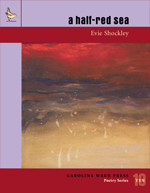Evie Shockley, 'a half-red sea' (Carolina Wren Press, 2006)
[Hello all, I realize this book review is about three years too late, but better now than never!]

Evie Shockley’s got a brave and firm grip on history; her first full-length collection of poems, a half-red sea, Harryette Mullen describes as “navigating against prevailing currents.” Indeed, Shockley skillfully navigates, pointedly assesses, and calls our acute attention to the prevailing current of the Middle Passage and of rivers, their historical and contemporary effects in shaping American world views on race and gender.
While the Middle Passage cannot be unmade, Shockley seeks instead to populate with real human lives and voices this Middle Passage, in which human bodies, her ancestors, “named and unnamed,” have been effectively commodified, “traded for victuals.” These prevailing currents are the movement of commerce and capital, apparent in “unbelievable sale!” Here, Martin Luther King Jr. Day has been stripped of its progressive possibilities, and reduced to a profit making opportunity, as befitting American consumerist culture. Shockley moves us backwards in history, beginning with the twentieth century white flight from the “trash” and “crime” of urban areas into the “safe” luxurious suburbs, and the subsequent gentrification of these same urban areas by the descendants of this white flight.
Back through time she continues to guide us, through a “cross-country subway,” better known as the Underground Railroad, and a “trans-atlantic cruise,” again, back to the Middle Passage. Her (not so) quiet parenthetical reminds us of the economic reality which deemed black bodies as 3/5 of a human body, a mere fraction of human. Shockley’s speaker is the travel agent who is rabid for her commission, and in this ironic, satirical voice, she reminds us of the relationship between race, agency, and movement. Those who “need a tan,” control the movement of capital, and therefore have so much freedom to flee and to return, whereas “customers with a natural tan,” are the commodity, risking their lives in flight, or being moved against their own wills and wishes.
“a thousand words” is the fold-out centerfold of a half-red sea. There is nothing sexy about this centerfold; it's pornographic and obscene, a word-dense and impenetrable naked portrait of torture, in which Shockley’s relentless free association of potent words links the historical and current states of violence in this country and in the world: “torture hooded bagged stacked stripped wired leashed cuffed smeared objectified what’s wrong with this torture…”. “a thousand words” concludes the book’s first section, “passage.”
Located in the middle of the book’s second section, “rafts,” is the poem “ode to ‘e’,” which seems the crux of this collection, as the speaker (presumably Shockley herself) is “named for a poet who never in her lifetime / published.” Shockley reminds us of the hard fates of the women, named and unnamed, who preceded her. Many of these women’s lives were tightly hemmed within the domestic, and without the ability to articulate openly their grievances: “i need—a dozen eggs / —a tub of lard—loaf bread—fatback—and rat poison / for the rat who sleeps in my bed.”
These are formalistically tight poems, as Shockley inserts herself into the intersecting traditions of her ancestors, of letters, and of song. She imagines Phyllis Wheatley and Sally Hemmings knocking back scotch whiskeys together, as they “think on rivers and rafts.” Here, Shockley’s foremothers recall Mark Twain’s boys on a raft in Huckleberry Finn, of which they both approve, especially as recommended reading for “sally’s kin,” presumably her mixed blood descendants with Thomas Jefferson. We are reminded also of Langston Hughes’ poem, “The Negro Speaks of Rivers” (1920): “my soul has grown deep like the rivers,” conduits for the commerce of African bodies.
Gwendolyn Brooks’ sonnet-ballad appears to be the model for “ballad of anita hill,” in which Shockley’s effective use of the Shakespearean sonnet’s rhyming end couplet succinctly and definitively sums up the reductive and conflicting American public opinion of Ms. Hill, and by extension, of the black woman in America, rendering invisible their professional and educational achievements: “you are a queen-bitch-jezebel-matriarch-whore, / destroyer of black manhood, and so much more.”
Consider that Wheatley, Hemmings, Hill, Hughes, Brooks, and “e,” are rafts upon these rivers, floating however tenuously upon the prevailing current. Shockley has relied upon them to remain afloat, and ultimately, she becomes as those before her, hence, “pull,” the third and final section of a half-red sea. In “— shall become as —,” whose title indicates the speaker’s (Shockley’s) transformation into a “raft” upon which others may rely in order to stay afloat — “you / put this knife in my // hand. we pull. we / meet as oceans come // together, heaving / against and clinging // across our salt watery // boundary.” I think of the act of pulling, drawing, as in, “for what you need draw from the river like it is well with my soul,” which appears a statement of her poetics.
There is much to be admired in this collection of poems. In addition to the sonnet-ballad form, she employs the pantoum and the acrostic in very smooth and revealing ways. As well, Shockley’s Harryette Mullen-esque word play on cliché — “good as guile,” “what’s in a shame,” “the freak shall inherit the mirth” — as if in mimicry of standard American English, is both playful and critical, in uncovering the darker implications of such conventionally throwaway phrases. It goes without saying that Shockley’s work is political, in language and in content. And this is quite satisfying to me as a reader constantly seeking intelligent, well-crafted, historically relevant poetry which is located in the world, tempered and telling urgently of real human lives.
Barbara Jane Reyes was born in Manila, the Philippines, and grew up in the San Francisco Bay area. She...
Read Full Biography

